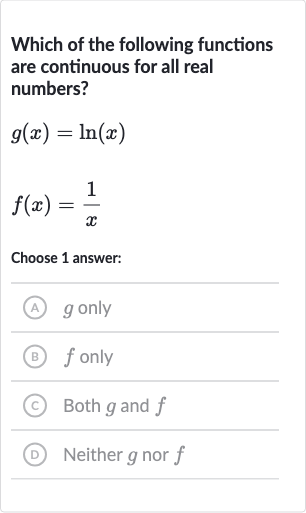Full solution
Q. Which of the following functions are continuous for all real numbers?Choose answer:(A) only(B) only(C) Both and D Neither nor
- Determine Continuity: We need to determine the continuity of the functions and for all real numbers.
- Consider : Let's first consider . The natural logarithm function is defined only for x > 0. Therefore, it is not defined for , which means it is not continuous for all real numbers.
- Consider : Now let's consider . The function is defined for all real numbers except , where it has a vertical asymptote. Therefore, it is not continuous at .
- Neither g nor f: Since neither nor is continuous for all real numbers, the correct answer is (D) Neither nor .
More problems from Identify discrete and continuous random variables
QuestionGet tutor help
QuestionGet tutor help
QuestionGet tutor help
QuestionGet tutor help
QuestionGet tutor help
QuestionGet tutor help
QuestionGet tutor help
QuestionGet tutor help
QuestionGet tutor help

